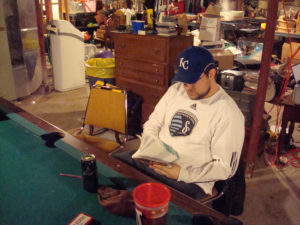Welcome to tabletop role-playing! We’re glad you’re here. You’re going to play an important character in a story, and you want to do the best you can. Good on you.
This blog post (and a few more coming later) provides advice to players of tabletop role-playing games, helping them to be better players. Each section will end with a specific action to take.
For simplicity’s sake, this paper will assume that you’re playing Dungeons & Dragons.
Help! I’ve Never Played Before!
Don’t panic!
The other players won’t expect you to memorize every rule. It’s like playing a board game; if you’re invited to play, you won’t be expected to have learned the rules ahead of time, but you will be expected to pay attention to them.
In other words, follow the advice in this blog post, and you’ll be fine.
Create the Character You Want to Play
Online, you’ll find advice about the “best” race, class, and abilities to choose to create a “balanced” party. But here’s the thing: that advice is usually aimed at experienced players who want to optimize their experience.
D&D is very tolerant of a variety of different characters, even several of the same characters. If your DM hasn’t given you specific parameters, create the character you want to play.
That said, a “lone wolf” character is very difficult to integrate into a group game like D&D. Avoid this trope if at all possible by giving your character in-world relationships.
Action: Look for a class, race, and other options that interest you.
…And Check With Your DM
The DM may be running a game in a very specific setting, where your character concept will have specific in-game consequences. For example, spellcasters or rogues may be seen with some level of suspicion by common folk. Some official races just won’t fit into the game world.
Also, the DM may suggest a particular race or class for you. That’s okay! Talk it over with your DM. If you really dislike the DM’s suggestion, suggest an alternative. Work it out until you find a character concept you like.
Action: Write down your character in as much detail as possible and send it to your DM, asking if it’s okay.
Know Your Character
Once you’ve built your character, spend some time memorizing as many of your character’s abilities as you can. In particular, pay attention to these stats:
- Attack bonuses
- Damage dice and bonuses
- Passive Perception
- Ability score bonuses
- Unusual abilities, like a resistance to one type of damage
Focus particularly on combat abilities, since you’ll probably be under some time pressure when you need to use those.
Don’t worry about memorizing everything! Just learn as much as you can.
Action: Memorize your character’s attack-related stats and passive Perception.
Show Up
If you agree to attend on a particular day, show up on time. Only cancel if you’re physically ill or something really unexpected and serious comes up, and give your group as much advanced warning as possible. Your DM put a lot of time into preparing the game for you; don’t waste it.
Bring Supplies
If you’re playing face-to-face, you’ll be interacting with other players for several hours. This requires some social niceties.
Bring your character sheet, at least one pencil, and extra paper for notes. If you don’t have dice, download a dice-rolling app onto your phone.
If you’re hosting, clean the play area and the nearest bathroom. I’m not talking hospital-level antiseptic; just clear enough for people to get around.
If you’re not hosting, bring snacks and/or drinks.
Action: Bring the supplies listed above.
Pay Attention During the Game
You don’t want to miss a vital clue! Your DM will be giving you lots of information during the game, and if you’re chatting with somebody else, checking your phone, or otherwise distracted, you may not notice something important.
And by “clue” I mean anything in the game: an enemy who seems weak, a side character who knows something she shouldn’t, a pool of water; any of these might take only a few words of description, so they’re easy to miss.
Your DM isn’t the only player at the table, though. The other players are playing, too! Watch what they’re doing and what their characters are doing. React to them! Agree with their decisions, suggest other options, and generally push the story forward.
Action: Mute your phone when the session starts, and don’t look at it during the session. If the DM’s talking, be silent and listen. (This assumes your DM doesn’t talk over you; see part 3 of this series if that happens.)
Do Things
Be active! This is a role-playing game, not a role-listening game. It’s almost always better to do something than to sit back passively.
Remember that you’re playing a character, not a series of die rolls. Your character will have opinions and take action even if the rest of the world isn’t pushing for it.
A few caveats here: don’t constantly poke at anything nearby just because there’s a brief lull in the action. A hopelessly ADHD character will cause problems for most groups; lots of things in the game poke back, and constant activity can be very frustrating for your fellow players.
Also, this applies to your own character, not to everyone else. It can be a lot of fun to spend an hour planning a heist, debating many different options for what to do.
Action: If you can’t decide what your character would do, choose one reasonable course of action and just do it. If the entire group is inactive, do something reasonable, but do something.
That’s it! Stand by for more advanced advice tomorrow.

